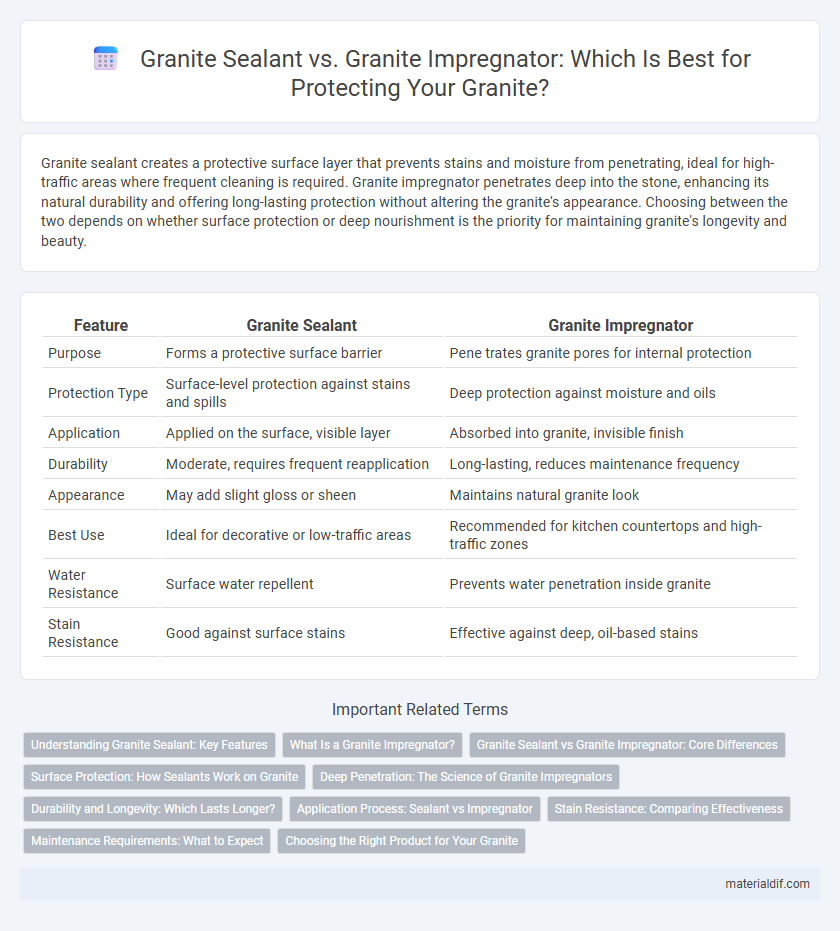Granite sealant creates a protective surface layer that prevents stains and moisture from penetrating, ideal for high-traffic areas where frequent cleaning is required. Granite impregnator penetrates deep into the stone, enhancing its natural durability and offering long-lasting protection without altering the granite's appearance. Choosing between the two depends on whether surface protection or deep nourishment is the priority for maintaining granite's longevity and beauty.
Table of Comparison
| Feature | Granite Sealant | Granite Impregnator |
|---|---|---|
| Purpose | Forms a protective surface barrier | Pene trates granite pores for internal protection |
| Protection Type | Surface-level protection against stains and spills | Deep protection against moisture and oils |
| Application | Applied on the surface, visible layer | Absorbed into granite, invisible finish |
| Durability | Moderate, requires frequent reapplication | Long-lasting, reduces maintenance frequency |
| Appearance | May add slight gloss or sheen | Maintains natural granite look |
| Best Use | Ideal for decorative or low-traffic areas | Recommended for kitchen countertops and high-traffic zones |
| Water Resistance | Surface water repellent | Prevents water penetration inside granite |
| Stain Resistance | Good against surface stains | Effective against deep, oil-based stains |
Understanding Granite Sealant: Key Features
Granite sealants create a protective surface layer that guards against stains, moisture, and wear, enhancing the natural beauty of polished granite countertops. These sealants are typically thicker and provide a glossy finish, making them ideal for high-traffic areas prone to spills and surface damage. Unlike granite impregnators, sealants do not penetrate deeply but form a durable barrier that requires periodic reapplication to maintain optimal protection.
What Is a Granite Impregnator?
A granite impregnator is a specialized sealant designed to penetrate deep into the porous surface of granite, creating an invisible barrier that repels water, oil, and stains without altering the stone's natural appearance. Unlike surface sealants that form a protective layer on top, impregnators work by filling the pores within the granite to enhance durability and resistance to damage from everyday use. This makes granite impregnators ideal for maintaining the stone's aesthetic qualities while providing long-lasting protection against moisture and contaminants.
Granite Sealant vs Granite Impregnator: Core Differences
Granite sealant forms a protective surface layer that repels water and stains, while granite impregnator penetrates deeply into the stone to protect from within without altering its natural texture. Sealants often create a glossy finish and typically require more frequent reapplication, whereas impregnators maintain the stone's breathability and durability with longer-lasting effects. Understanding these core differences helps in selecting the appropriate product based on desired appearance, maintenance frequency, and protection level.
Surface Protection: How Sealants Work on Granite
Granite sealants create a protective layer on the surface, preventing water, oil, and stains from penetrating the stone by forming a barrier that repels liquids and contaminants. This surface protection preserves the polished finish and enhances the granite's resistance to everyday wear and tear. Unlike impregnators, which penetrate the stone to protect from within, sealants primarily protect the granite's top layer, making them ideal for high-traffic areas requiring durable surface shielding.
Deep Penetration: The Science of Granite Impregnators
Granite impregnators utilize advanced nanoparticle technology to achieve deep penetration into the stone's microscopic pores, providing robust protection against stains and moisture without altering the surface appearance. Unlike surface sealants that form a barrier on top, impregnators chemically bond within the granite, enhancing durability and resistance to environmental damage. Scientific studies confirm that this deep-seated protection prolongs the natural beauty and structural integrity of granite over time.
Durability and Longevity: Which Lasts Longer?
Granite sealants create a protective film on the surface, offering short-term durability typically lasting 1 to 3 years before requiring reapplication, while granite impregnators penetrate deep into the stone, providing long-lasting protection that can endure 5 to 10 years or more. Impregnators enhance the stone's resistance to stains, moisture, and wear without altering its natural appearance or breathability. For extended longevity and minimal maintenance, granite impregnators are generally the preferred choice over surface sealants.
Application Process: Sealant vs Impregnator
Granite sealant forms a protective surface layer by sitting on top of the stone, requiring thorough cleaning and drying before application with a brush or roller, followed by curing time to achieve a glossy or matte finish. Granite impregnator penetrates deep into the stone's pores using a low-viscosity, solvent-based formula applied with a spray or cloth, enhancing resistance to stains without altering the surface texture. The sealant application demands more surface preparation and drying time, while the impregnator allows quicker absorption and natural appearance retention.
Stain Resistance: Comparing Effectiveness
Granite sealants create a protective barrier on the surface of granite, effectively preventing stains by blocking liquids from penetrating the stone. Granite impregnators penetrate the stone's pores, providing deep stain resistance without altering the granite's natural appearance or texture. Studies show that sealants offer superior initial stain protection, while impregnators provide longer-lasting defense by maintaining breathability and reducing the risk of moisture build-up.
Maintenance Requirements: What to Expect
Granite sealant creates a protective surface layer that requires periodic reapplication every 1 to 3 years to maintain its water and stain resistance. Granite impregnator penetrates the stone, offering longer-lasting protection that typically needs maintenance only every 5 to 10 years, depending on usage and exposure. Regular cleaning is essential for both, but impregnators demand less frequent upkeep due to their deep-penetrating properties.
Choosing the Right Product for Your Granite
Granite sealant forms a protective layer on the surface, preventing stains and moisture penetration, ideal for areas exposed to spills and heavy use. Granite impregnators penetrate deep into the stone, enhancing durability and resistance from within while maintaining the natural appearance without altering the surface texture. Choosing the right product depends on the granite's finish and location; sealants suit polished, high-traffic surfaces, whereas impregnators are better for porous or honed granite requiring breathability and long-term protection.
Granite Sealant vs Granite Impregnator Infographic

 materialdif.com
materialdif.com